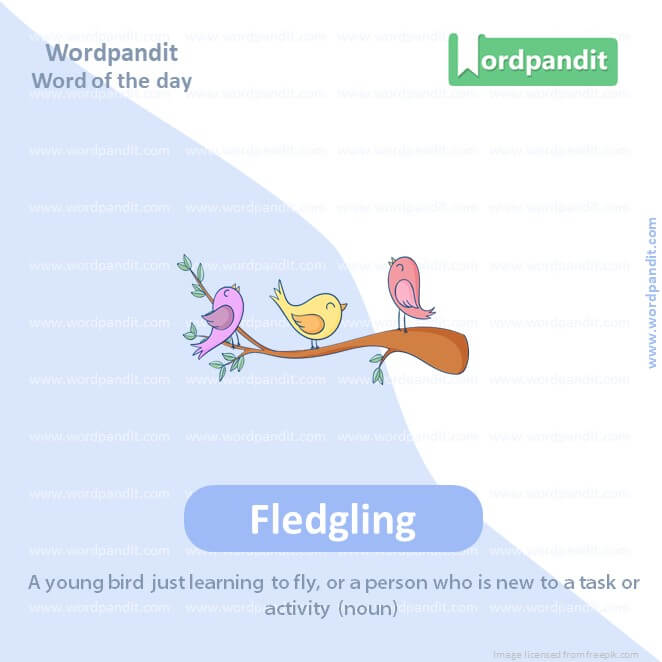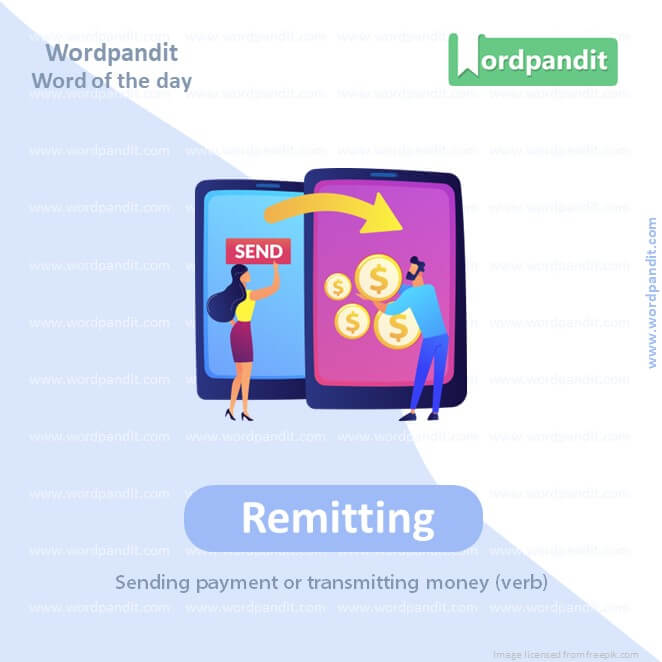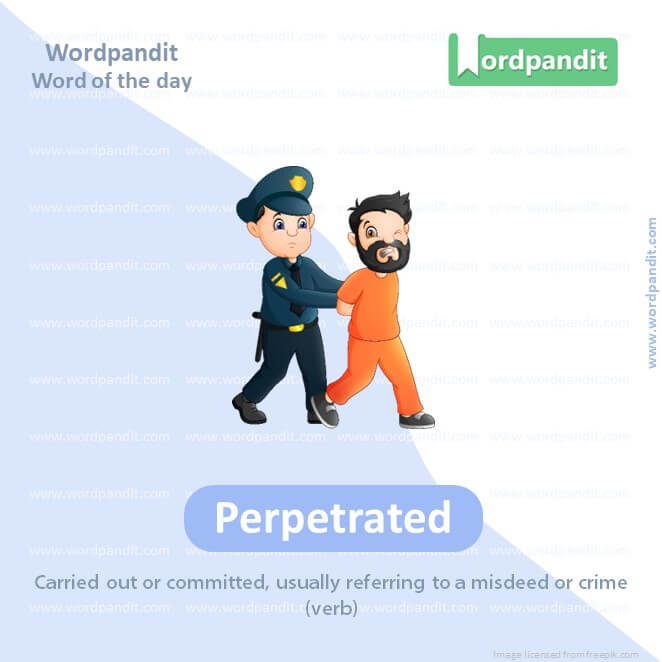Daily Vocabulary Words: List of Daily Used Words in Leading Indian Newspapers
Hi there. Welcome to this special section @ Wordpandit. Our endeavour here is straightforward: highlighting daily vocabulary words that you would come across in leading newspapers in the country. We have included the following newspapers in our selection:
• The Times of India
• The Economic Times
• Hindustan Times
• Mint
• Indian Express
We are putting in extensive work to develop your vocabulary. All you have to do is be regular with this section and check out this post daily. This is your repository of commonly used words; essentially, we are posting a list of daily used words. Hence, this has significant practical application as it teaches you words that are commonly used in leading publications mentioned above.
Visit the website daily to learn words from leading Indian newspapers.
WORD-1: Pertinently
CONTEXT: He has pertinently observed that the geographical arrangement of the four dhams, 12 jyotirlingas, and the concept of our Shaktipeeths connecting different corners of our country is an expression of Ek Bharat, Shreshtha Bharat spirit.
SOURCE: Hindustan Times
Explanatory Paragraph: Imagine you are talking about your favorite ice cream, and you say that you love chocolate flavor because it is sweet and yummy. When you explain exactly why you like it during our conversation about ice cream, that’s being “pertinently.” It means you are saying something that fits perfectly with what we are talking about.
MEANING: Relating directly to the matter at hand (adverb).
PRONUNCIATION: PUR-tuh-nent-lee
SYNONYMS: relevantly, appropriately, suitably, fittingly, aptly
USAGE EXAMPLES:
- He answered pertinently when asked about his reasons for choosing the science project.
- The teacher praised her for her pertinently raised question during the lesson.
- During the meeting, he contributed pertinently to the discussion on budget cuts.
- She pertinently pointed out the error in the calculations.

WORD-2: Fledgling
CONTEXT: His fledgling party polled about 3 percent votes and won four seats.
SOURCE: Hindustan Times
Explanatory Paragraph: Think about a little baby bird that just started to grow its feathers and is learning how to fly. This little bird is called a “fledgling.” It’s very young and new at flying, just like when you first tried to ride your bicycle without training wheels.
MEANING: A young bird just learning to fly, or a person who is new to a task or
activity (noun).
PRONUNCIATION: FLEJ-ling
SYNONYMS: newbie, novice, beginner, rookie, apprentice
USAGE EXAMPLES:
- The fledgling birds were chirping in their nest, eager to fly.
- She is a fledgling writer, having just published her first poem.
- Our company is a fledgling in the industry, established only a year ago.
- As a fledgling guitarist, he practices for hours every day.

WORD-3: Confrontations
CONTEXT: the damaged image of the Benjamin Netanyahu government could tie up Israel’s resources in its indirect confrontations with Iran.
SOURCE: Hindustan Times
Explanatory Paragraph: When you and your friend both want the same toy and you start arguing about who should play with it, that’s a “confrontation.” It’s when people meet and have a little fight or argument because they disagree about something.
MEANING: Face-to-face meetings or conflicts between opposing individuals or groups (noun).
PRONUNCIATION: kon-fruhn-TAY-shunz
SYNONYMS: conflicts, clashes, disputes, altercations, encounters
USAGE EXAMPLES:
- There were several confrontations at the meeting when opinions differed.
- The two teams had a confrontation on the field after a foul play.
- Avoiding confrontations at family gatherings can make them more enjoyable.
- He is known for his skill in resolving confrontations peacefully.

WORD-4: Remitting
CONTEXT: the government of Gujarat passed an order remitting their sentence, setting them free.
SOURCE: Hindustan Times
Explanatory Paragraph: Imagine if you have a piggy bank where you save money, and when you decide to send some of that money to your friend to help them buy a new toy, that’s called “remitting.” It means sending money to someone or somewhere, especially far away.
MEANING: Sending payment or transmitting money (verb).
PRONUNCIATION: re-MIT-ing
SYNONYMS: sending, transferring, dispatching, conveying, transmitting
USAGE EXAMPLES:
- He is remitting part of his earnings to his family in another country.
- The doctor noted that the patient’s symptoms were remitting slowly.
- Remitting funds overseas can sometimes incur high fees.
- The court considered remitting her sentence due to good behavior.

WORD-5: Apostates
CONTEXT: these groups bore a militant aversion to minority Shia Muslims, considered heretical apostates by Salafi and Sunni orthodoxy.
SOURCE: Hindustan Times
Explanatory Paragraph: Think about someone who is part of a team but decides to leave because they don’t agree with the team rules anymore. This person is called an “apostate.” They used to believe in the team’s ideas but changed their mind and stopped being part of the group.
MEANING: Individuals who have abandoned a religious faith or political belief
(noun).
PRONUNCIATION: uh-POS-tayts
SYNONYMS: defectors, deserters, renegades, turncoats, traitors
USAGE EXAMPLES:
- Apostates often face criticism and rejection from their former community.
- The history book included a chapter on famous apostates who changed religions.
- She studied the motivations of apostates who left various political movements.
- In some cultures, apostates are ostracized or even threatened.
WORD-6: Discretion
CONTEXT: The government is thus granted the discretion to remit sentences and reintegrate a convicted individual back into society.
SOURCE: Hindustan Times
Explanatory Paragraph: When you have a secret, and you can choose who to tell or keep it to yourself, you are using “discretion.” It’s like being really careful about what you say or do, especially when you need to protect a secret or make a decision.
MEANING: The quality of behaving or speaking in such a way as to avoid causing offense or revealing private information (noun).
PRONUNCIATION: dih-SKREH-shun
SYNONYMS: prudence, judiciousness, tact, carefulness, circumspection
USAGE EXAMPLES:
- She used her discretion to not share her friend’s secret.
- The teacher exercised discretion in handling the sensitive issue.
- Discretion is advised when discussing personal matters in public.
- The officer used discretion in deciding not to issue a ticket.

WORD-7: Perpetrated
CONTEXT: Although Iran-backed forces have perpetrated several crimes against Iraqi Sunnis in the past, IS displayed its sectarian ruthlessness in massacres like that of Camp Speicher in 2014.
SOURCE: Hindustan Times
Explanatory Paragraph: Imagine someone doing something very naughty, like taking cookies from the cookie jar without asking. When they do this, they are “perpetrating” that act. It means they are the ones who did the naughty thing.
MEANING: Carried out or committed, usually referring to a misdeed or crime (verb).
PRONUNCIATION: PUR-puh-tray-ted
SYNONYMS: committed, executed, carried out, performed, enacted
USAGE EXAMPLES:
- The crime was perpetrated by a known criminal.
- She was accused of perpetrating a fraud at her company.
- The hoax was perpetrated by a group of students as a prank.
- Efforts are made to prevent crimes perpetrated against the elderly.
WORD-8: Unceremoniously
CONTEXT: He quit the party after he was unceremoniously removed from the chief minister’s post in 1999.
SOURCE: Hindustan Times
Explanatory Paragraph: If you’re playing a game and suddenly someone stops the game and says it’s over without any warning or goodbye, that’s “unceremoniously.” It means doing something suddenly and without any special attention or respect that might usually be expected.
MEANING: Done rudely or abruptly, without the formalities or courtesies that are usually performed (adverb).
PRONUNCIATION: un-suh-REH-muh-nee-us-lee
SYNONYMS: abruptly, rudely, suddenly, brusquely, harshly
USAGE EXAMPLES:
- He was unceremoniously fired from his job without a clear explanation.
- The guest was unceremoniously escorted out of the party.
- The decision was made unceremoniously, leaving everyone surprised.
- The changes in policy were introduced unceremoniously.
WORD-9: Contingency
CONTEXT: The then Prime Minister PV Narasimha Rao did not accept a comprehensive contingency plan of the home ministry prepared before the demolition.
SOURCE: Hindustan Times
Explanatory Paragraph: Imagine you have a plan to play outside, but it might rain. So, you also plan to play games inside just in case. This second plan is a “contingency.” It’s a backup plan you have ready for something unexpected that might happen.
MEANING: A future event or circumstance that is possible but cannot be predicted with certainty (noun).
PRONUNCIATION: kun-TIN-juhn-see
SYNONYMS: possibility, eventuality, emergency, scenario, plan B
USAGE EXAMPLES:
- They set aside extra funds as a contingency for unexpected costs.
- A good business plan includes contingencies for dealing with sudden market changes.
- The event organizers had contingencies in place for bad weather.
- It’s wise to have a contingency plan in case of a power outage.
WORD-10: Reluctant
CONTEXT: Sonia Gandhi, who had been reluctant to enter politics after the assassination of her husband and late Prime Minister Rajiv Gandhi in 1991, finally took the plunge in 1997 and with that Rao’s era ended.
SOURCE: Hindustan Times
Explanatory Paragraph: When your mom asks you to clean your room and you don’t really want to do it, you feel “reluctant.” It means you are not excited or eager about having to do something and you might even feel a little unwilling to start.
MEANING: Unwilling or hesitant to do something (adjective).
PRONUNCIATION: ruh-LUK-tunt
SYNONYMS: hesitant, unwilling, disinclined, resistant, averse
USAGE EXAMPLES:
- He was reluctant to speak in front of the large crowd.
- She felt reluctant to leave the party early.
- Despite his reluctance, he agreed to help with the project.
- The reluctant participant eventually enjoyed the event.
Vocabulary English Grammar
Delving into the vast universe of language learning, the ‘Vocabulary English Grammar’ acts as a beacon, illuminating the path to mastery. This synergy of words and rules forms the quintessential framework of the English language. However, understanding ‘Vocabulary English Grammar’ in-depth requires a fine-tuned strategy.
First and foremost, understanding ‘Vocabulary English Grammar’ goes beyond only remembering rules and words. It involves learning how a word functions in a grammatical context. To achieve this, resources like textbooks, online grammar guides, and interactive language learning apps prove to be very valuable.
However, embracing ‘Vocabulary English Grammar’ calls for consistent practice. Adopting thematic learning, where you concentrate on a specific grammatical concept and the vocabulary related to it, can be particularly effective. Reading material like articles and books, or engaging with podcasts and films can provide a real-world context to these concepts.
The key to mastering ‘Vocabulary English Grammar’ lies in constructing sentences. Instead of memorizing disconnected words and rules, start framing sentences. This active application significantly bolsters comprehension and provides practical insight into how grammatical rules govern the use of words.
To truly excel in ‘Vocabulary English Grammar’, it’s important to seek feedback. Participate in language exchange platforms or conversation clubs. These platforms provide an opportunity to apply what you’ve learned and obtain constructive feedback on your progress.
In essence, understanding ‘Vocabulary English Grammar’ is a step-by-step process that requires thoughtful learning, constant practice, application, and proactive feedback. By embedding these techniques into your language learning routine, you can confidently navigate ‘Vocabulary English Grammar’. Remember, mastering ‘Vocabulary English Grammar’ is not about perfection, but about progression and communication. Each rule learned, each word comprehended, brings you closer to the fluency in your English language journey.







